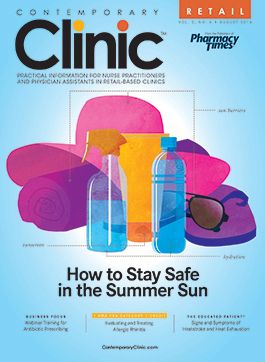The Little Clinic's Ann Tracy, APRN, FNP-C
Ann Tracy, APRN, FNP-C, has demonstrated her commitment to patient health and education throughout her distinguished nursing career.
Ann Tracy, APRN, FNP-C, has demonstrated her commitment to patient health and education throughout her distinguished nursing career.
After earning her nursing degree from Wichita State University (WSU), she used her skills and knowledge in a variety of roles, from an infection control coordinator, to an assistant director of nursing for a long-term care organization, to a registered nurse in hospital transplant, burn intensive care, neuro intensive care, and cardiac units. However, believing that she could better serve her patients in a different capacity, Tracy later went back to WSU for her master’s and then soon became certified as a nurse practitioner (NP).
“After 20 years of my nursing career, I felt like I had more that I could give to my patients,” Tracy told Contemporary Clinic. “Pursuing my master’s degree allowed me to continue to be a nurse, but on a new level. I pull knowledge and skills from my past nursing experiences every day.”
Following her certification, Tracy worked as an NP for Mid Kansas Pediatrics in Wichita, Kansas, where she managed the acute illnesses and chronic diseases of infants, children, and adolescents. After discovering a passion for education upon co-developing the practice’s asthma education plan, she later returned to WSU once more as a clinical instructor, where she taught nursing students to apply classroom theory to hospital settings.
Tracy next took her talents to Heartspring, a Wichita-based nonprofit school for children with special needs, where she managed the primary care needs of all students with developmental disabilities. She currently works as an NP for The Little Clinic in Wichita, where she performs physicals and administers immunizations to a high volume of patients in a clinical setting.
“I learn something every day from my colleagues and patients that makes me a better provider, including different ways to think about a situation and ways to be more efficient while providing quality care,” Tracy explained. Reflecting upon her career, she’s most grateful for the opportunities she has had to help patients improve their health. “With so many choices to access health care, I feel privileged that patients chose to come see me and put their health and well-being in my hands,” Tracy said.
Q: What do you think is the most important quality for a health care provider to possess?
A: Empathy. In order to connect with your patients and help them, you need to have the ability to be sensitive and identify with their concerns. Kindness and a smile can go a long way.
Q: What do you think is the most important issue in the medical field today?
A: Providing cost-effective care to all patients. There are so many patients who either can’t afford insurance or can’t afford to access health care when they are sick.
Q: Is there a particularly interesting or funny story you would like to share from your experience as a clinician?
A: A patient put her contact lens in the day before her visit. It didn’t feel right all day and was scratching her eye. She removed the contact, but her eye was still very irritated. During my exam, I asked about her vision, to which she replied that she could see well even without a contact in. I examined her eye, and upon telling her that she still had a contact in, she realized that she must have put 2 contacts in, but only removed one. I asked her to remove the contact and she immediately felt better. She couldn’t believe that she didn’t realize that on her own. We had a good laugh together.
Q: What advice would you give to aspiring NPs?
A: Individualize your patient care and really listen to what the patient is saying. I think we often have the misconception that sick patients all want to leave with an antibiotic. If the patient has a virus, I have found that most patients are very receptive to me if I validate their condition and tell them that I want to help them find something that will relieve their symptoms, and they appreciate me spending the time to listen to them.

Knock Out Aches and Pains From Cold
October 30th 2019The symptoms associated with colds, most commonly congestion, coughing, sneezing, and sore throats, are the body's response when a virus exerts its effects on the immune system. Cold symptoms peak at about 1 to 2 days and last 7 to 10 days but can last up to 3 weeks.
COPD: Should a Clinician Treat or Refer?
October 27th 2019The Global Initiative for Chronic Obstructive Lung Disease (GOLD) defines the condition as follows: “COPD is a common, preventable, and treatable disease that is characterized by persistent respiratory symptoms and airflow limitation that is due to airway and/or alveolar abnormalities usually caused by significant exposure to noxious particles or gases.â€
Diabetic Ketoacidosis Is Preventable With Proper Treatment
October 24th 2019Cancer, diabetes, and heart disease account for a large portion of the $3.3 trillion annual US health care expenditures. In fact, 90% of these expenditures are due to chronic conditions. About 23 million people in the United States have diabetes, 7 million have undiagnosed diabetes, and 83 million have prediabetes.
What Are the Latest Influenza Vaccine Recommendations?
October 21st 2019Clinicians should recommend routine yearly influenza vaccinations for everyone 6 months or older who has no contraindications for the 2019-2020 influenza season starting at the end of October, according to the Advisory Committee on Immunization Practices.
What Is the Best Way to Treat Pharyngitis?
October 18th 2019There are many different causes of throat discomfort, but patients commonly associate a sore throat with an infection and may think that they need antibiotics. This unfortunately leads to unnecessary antibiotic prescribing when clinicians do not apply evidence-based practice.
